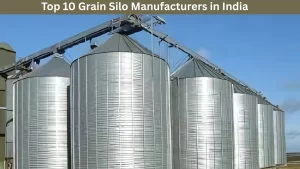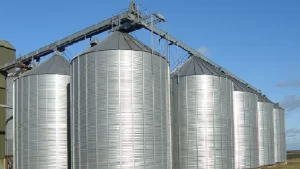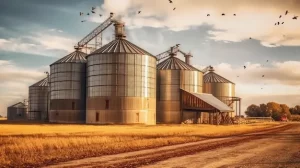Storage plays a vital role in maintaining product quality, optimizing logistics, and ensuring food security. These storage silos are used in the agricultural and industrial sectors. One of the most important storage solutions used across the globe is the silo. But what is a silo? And more specifically, what is a grain silo? At Prairies Partners Global Solution, we specialize in comprehensive storage and logistics systems that serve modern agriculture and industry. In this blog we describe in detail about silo and grain silos especially when it comes to storing grains.
What is a silo?
A Silo is a structure used for storing bulk materials. These materials can range from cement and coal to food products and agricultural grains. Silos are designed to keep materials in a controlled environment, protect them from external elements like moisture and pests, and allow for easy loading and unloading. Silos can be vertical or horizontal, cylindrical or rectangular, and made from a variety of materials such as concrete, steel, aluminum, or even plastic. Their use spans multiple industries including agriculture, construction, mining, and manufacturing.
History of Silo:
The origin of the word “silo” comes from the Greek word “siros,” which means a pit for holding grain. The earliest forms of silos were simply underground pits or clay-lined holes used by ancient civilizations to store food supplies. Over the centuries, silo technology has evolved significantly, with modern silos incorporating advanced materials, aeration systems, and digital monitoring tools. Today, silos are a fundamental part of supply chains, especially in farming and grain production.
What is a Grain Silo?
A grain silo is a specific type of silo used for storing harvested grain crops such as wheat, corn, barley, soybeans, and rice. These silos are designed to maintain the integrity and nutritional value of the grain over time. Grain silos protect the grain from spoilage, insects, rodents, and the effects of weather. They also facilitate the efficient movement of grain through the supply chain, from farm to mill to market.
There are different types of grain silos, and each type serves a particular need. The three main types are tower silos, bunker silos, and bag silos. Tower silos are tall, cylindrical structures commonly made of concrete or steel. These are the traditional grain silos seen dotting the rural landscape and are ideal for long-term storage. Bunker silos, on the other hand, are horizontal trenches typically lined with concrete and covered with tarps. These are easier to load and unload and are often used for silage or high-moisture grains. Lastly, bag silos are large plastic tubes used for temporary storage and are popular for their mobility and low setup cost.
Features of Grain Silos
The internal environment of a grain silo is carefully controlled to ensure the best preservation of stored grain. Modern grain silos are equipped with aeration systems to regulate temperature and moisture, preventing mold growth and spoilage. Advanced monitoring systems allow farmers and operators to track the condition of the grain in real time, which helps in making timely decisions regarding drying, fumigation, or unloading. At Prairies Partners Global Solution, we emphasize the importance of investing in high-quality silo systems with integrated technologies to reduce post-harvest losses and improve operational efficiency.
Uses of Grain Silos
With increasing global demand for food, efficient grain storage has become a crucial element of food security. Grain silos help in buffering supply during harvest gluts, stabilizing prices, and ensuring a consistent supply of grains throughout the year. Without silos, a significant portion of the harvested grain could be lost due to improper storage, which would not only affect farmers’ incomes but also lead to increased food prices and scarcity.
Working Principles of Grain Silos
Grain silos are important in facilitating the export of grains. Countries that produce more grain than they consume rely on silos to store the surplus while awaiting transportation to ports or borders. This is particularly important in regions like the Canadian Prairies, where vast quantities of grain are harvested each year. We understand the logistical challenges of storing and moving large volumes of grain, and we offer tailored silo solutions that meet both domestic and international requirements.
When selecting a grain silo, several factors must be considered, including storage capacity, type of grain, moisture content, climate conditions, and budget. The wrong silo can lead to costly losses, while the right silo can greatly improve profitability and sustainability. Prairies Partners Global Solution provides expert consultation and engineering support to ensure that our clients choose the most suitable silo systems for their specific needs.
In recent years, sustainability has become a major focus in agriculture and industry. Silos contribute to sustainability by reducing waste, minimizing energy use in storage and transportation, and helping farmers store more grain with less environmental impact. For example, modern silos with automated unloading systems can reduce the need for manual labor and minimize grain spillage, making the entire process cleaner and more efficient.
To sum up, the answers to the questions “What is a silo?” and “What is a grain silo?” are foundational to understanding modern agriculture and supply chain logistics. A silo is not just a storage container—it is a critical component of food preservation, economic stability, and sustainable farming. A grain silo, in particular, ensures that one of the world’s most important resources—food—is stored safely and distributed efficiently.
Conclusion
Prairies Partners Global Solution are committed to delivering innovative, reliable, and sustainable silo solutions to meet the ever-evolving demands of the global agriculture industry. Whether you’re a small farmer looking for affordable grain storage or a large agribusiness needing an integrated silo and logistics system, we have the expertise and technology to support your goals. Reach out to us to learn more about our silos contact us on 9310139381 or write us at info@prairiespartners.com




